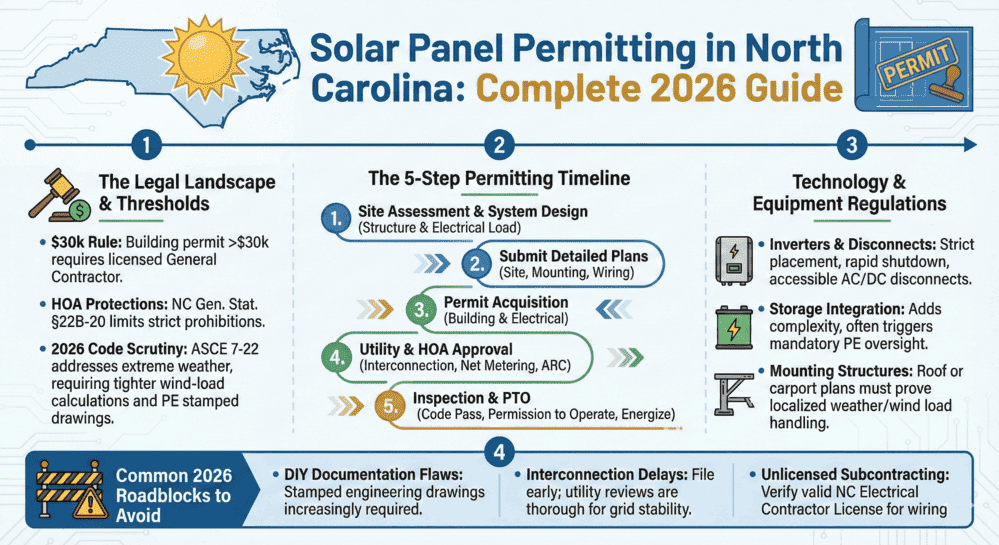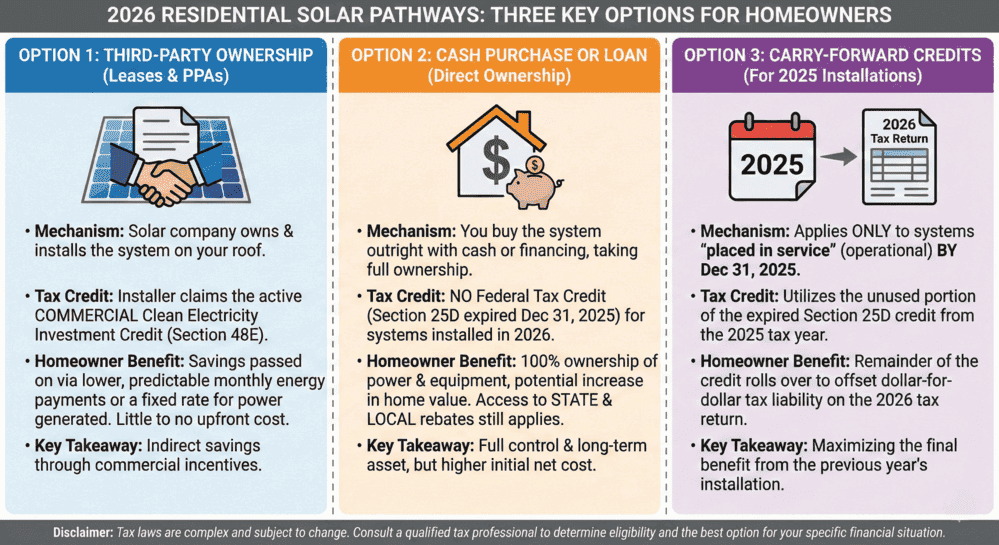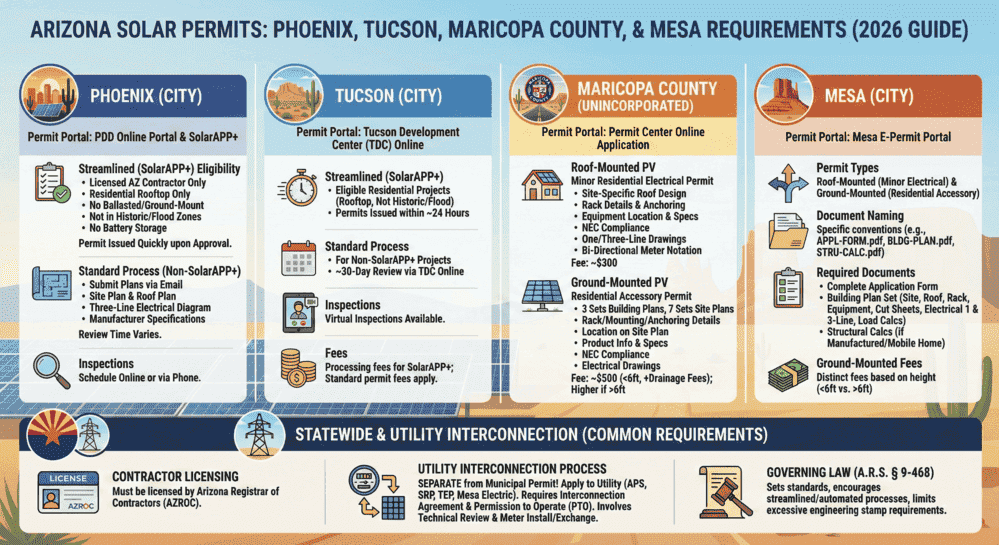Florida’s HB 683 solar permitting law, effective July 1, 2025, requires local governments to approve residential solar permits within five business days or face automatic approval. The bipartisan legislation signed by Governor Ron DeSantis on June 13, 2025, eliminates contract documentation requirements, authorizes private and virtual inspections, and reduces soft costs for homeowners installing solar panels. This reform comes as the 30% federal solar tax credit ends after 2025, representing a $9,000 average loss for homeowners.
Key provisions include: mandatory five-day permit approval timelines with automatic approval for missed deadlines, authorization for private inspection providers instead of municipal building departments, permission for virtual inspections to accelerate installation schedules, support for automated permitting platforms like SolarAPP+, and adjusted permitting fees reflecting faster processing times. Florida joins New Jersey (SB4100), Texas (SB 1202), Minnesota (HF4700), and Colorado in implementing solar permitting reforms during 2024-2025. The legislation addresses historical permitting delays of up to 30 days in some Florida jurisdictions, reducing administrative bottlenecks that increase installation costs and timelines. For Florida homeowners, HB 683 provides critical timing relief to complete solar installations before the federal tax credit deadline while benefiting from reduced permitting costs and expedited approval processes.
Florida’s recent legislation simplifies permitting procedures, eliminates processing delays, and reduces expenses. The timing proves particularly valuable as the federal solar tax incentive concludes in 2026.
While Congress eliminated the 30% federal solar tax incentive for installations completed after this year, Florida implements measures to help property owners achieve solar savings through alternative channels. New legislation effective July 1st aims to eliminate permitting bottlenecks and remove bureaucratic obstacles for homeowners pursuing solar energy, potentially eliminating thousands in administrative expenses.
The implementation timing proves optimal. With the tax incentive officially concluding next year following President Trump’s signature on his “Big, Beautiful, Bill” on July 4, Florida property owners could have encountered dual challenges: Forfeiting the $9,000 average federal tax incentive while navigating the persistent permitting complications that have traditionally hindered solar installations throughout the state. Fortunately, HB 683 resolves at least one of these obstacles.
The bipartisan construction reform legislation, enacted by Governor Ron DeSantis on June 13, 2025, transforms solar permitting through methods that could substantially decrease both installation durations and expenses for Florida property owners, precisely when these improvements matter most.

How Florida’s Recent Legislation Impacts Solar Installations
HB 683 addresses multiple obstacles that have unnecessarily increased solar installation expenses and timelines. Here’s what transforms for Florida property owners:
Permit Approval Within Five Days Maximum
For single-trade installations like rooftop solar systems, municipal governments now operate under a five business day deadline to evaluate and approve permit submissions. Exceed this timeframe? The permit receives automatic approval and must be processed the following business day.
This represents a transformative development for Florida property owners who’ve encountered permitting delay frustrations. Certain local permitting authorities require up to 30 days for processing, evaluation, and approval voting. Compressed timelines translate to reduced overhead expenses for installation companies, cost reductions typically transferred to property owners.
This will also accelerate the timeline for Florida property owners seeking to secure the solar tax incentive before the year-end cutoff.
Reduced Documentation Demands
Municipal governments can no longer mandate contract copies or supplementary documents, such as expense itemizations or commitment letters, for building permit issuance. While this appears to be a modest adjustment, it removes one of the most significant administrative obstacles in solar permitting.
Private and Remote Inspections Now Permitted
Property owners can now select private inspection services rather than waiting for municipal building department availability. The legislation also authorizes remote inspections, which can further accelerate installation schedules and enhance accessibility.
As Justin Hoysradt, co-founder of Fix My Solar, a solar maintenance operation located in West Palm Beach, Florida, stated, “Private providers deliver speed, safety, and expense reductions along with an elevated level of accountability through on-demand recorded visual and remote inspections that will advance construction standards upward and forward without the bureaucratic obstacles typically encountered at municipal offices.”
Authorization for Automated Permitting Platforms
HB 683 authorizes private providers to implement automated or software-driven plan evaluation systems and code verification. This modification enhances support for platforms like SolarAPP+, a web-based platform from the U.S. Department of Energy’s National Renewable Energy Laboratory (NREL) that’s engineered to standardize and automate residential solar permitting.
Fees Align With Accelerated Processing
Municipal building departments must now modify their permitting fees to correspond with adjustments in processing durations and inspection approaches, particularly when private providers handle services instead of the municipality.
This modification aims to prevent homeowners from excessive payments for services. The precise impact will differ by municipality, but over time, it could generate lower permitting expenses as departments upgrade their systems.
Why This Legislation Matters Now
For the typical property owner, the federal tax incentive ending after this year represents a $9,000 savings loss.
While HB 683 cannot substitute the tax incentive, it can help compensate for some of the financial difference by reducing what the solar industry identifies as soft costs, the non-equipment expenses like permitting, inspections, and administrative charges that can add thousands to a solar installation.
Equally important, the legislation accelerates the complete solar installation timeline. With automatic permit approval following five days and simplified inspections, installations that previously required months can now advance much faster, essential for property owners working to install before year-end.
Florida Participates in an Expanding Movement
HB 683 was introduced by Rep. Griff Griffitts with bipartisan backing, expanding on an earlier solar-focused bill (HB 1071) that was set aside earlier this year. Legislators incorporated HB 1071’s critical provisions, including private inspections, remote inspections, and expedited timelines, into the comprehensive construction reform package.
“The bill sponsors and advocates had the vision to recognize Florida’s future with the integration of solar and battery storage installations in this landmark construction legislation,” stated Justin Hoysradt of Fix My Solar.
And Florida isn’t the only state addressing solar permitting obstacles. Additional states are enacting comparable reforms:
New Jersey unanimously approved the “Smart Solar Permitting” bill (SB4100) in June 2025, mandating local governments to utilize the state’s Smart Solar Permitting Platform or comparable automated platforms.
Texas approved SB 1202 in June 2025, authorizing licensed third-party professionals to evaluate and inspect residential solar and storage permits and circumvent slower municipal evaluation, effective September 1, 2025.
Minnesota enacted the Energy Infrastructure Permitting Act (HF4700) into law in May 2024, designating $2 million for local SolarAPP+ implementation to simplify residential solar permitting.
Colorado relaunched its Automated Permit Processing for Solar (APPS) grant program in September 2024, providing $1 million in funding for jurisdictions implementing automated solar permitting platforms.
These initiatives reflect a unified objective of removing the bureaucratic obstacles that decelerate clean energy implementation and inflate expenses. Florida’s HB 683 achieves precisely that. “[It’s] beneficial for the construction industry, beneficial for the consumer, and beneficial for the taxpayer,” stated Hoysradt.
For Florida property owners evaluating solar, the directive is unmistakable: The state is making the solar adoption process more efficient and more affordable. Now it’s time to take action before the federal tax incentive expires in 2026.
Solar Permit Solutions
Homeowner Going Solar?
Get the permit-ready plan set your city requires — delivered fast so your solar project stays on schedule.
Conclusion
Florida’s HB 683 represents a pivotal moment for property owners considering solar energy adoption. While the loss of the federal tax incentive after this year creates financial challenges, the state’s commitment to streamlining permitting processes offers tangible relief through reduced soft costs and accelerated installation timelines. The five-day permit approval mandate, authorization of private inspections, and support for automated permitting platforms collectively transform what has historically been a bureaucratic obstacle course into an efficient, homeowner-friendly process. For Florida residents weighing solar installation decisions, the combination of current federal incentives and new state-level reforms creates a unique window of opportunity. Acting now means capturing both the remaining tax credit benefits and the advantages of Florida’s modernized permitting framework, positioning your home for long-term energy savings while contributing to the state’s clean energy future. The infrastructure is now in place to make solar adoption faster, more affordable, and more accessible than ever before.
FAQs
What happens if my local government doesn’t approve my solar permit within five business days?
Under HB 683, if your local government fails to review and approve your single-trade solar permit application within five business days, the permit is automatically approved. The municipality must issue the permit the next business day. This automatic approval provision eliminates the lengthy delays that previously extended permitting timelines to 30 days or more in some Florida jurisdictions.
Does Florida’s new solar permitting law apply to battery storage systems as well?
Yes. HB 683 includes provisions for both solar and battery storage installations. The legislation recognizes the growing importance of energy storage systems and applies the same streamlined permitting processes, private inspection authorizations, and expedited timelines to battery storage projects. This makes it easier and more affordable for Florida homeowners to install comprehensive solar-plus-storage systems that provide backup power during outages. Whether you need assistance with commercial solar design or guidance on navigating the new regulations, contact our team to ensure your project takes full advantage of these reforms.
Homeowner Going Solar?
Get the permit-ready plan set your city requires — delivered fast so your solar project stays on schedule.
Frequently Asked Questions
The 30% federal solar tax credit ends for systems installed after this year. To qualify for the full $9,000 average benefit, you must complete your solar installation before December 31 of this year. Florida's new HB 683 legislation helps expedite this process with five-day permit approvals, making it more feasible for homeowners to meet this deadline.
While exact savings vary by municipality and project size, HB 683 reduces soft costs—including permitting fees, inspection charges, and administrative expenses—that typically add thousands of dollars to solar installations. The five-day approval timeline also reduces installer overhead costs, which are generally passed along to homeowners. Combined with expedited timelines and private inspection options, property owners can expect meaningful reductions in total installation costs.
Yes. HB 683 explicitly authorizes homeowners to select private inspection providers rather than relying solely on local building departments. The legislation also permits virtual inspections, which offer additional flexibility and can further accelerate your installation timeline. Private providers typically offer faster scheduling, recorded inspections for accountability, and higher construction standards.
Under HB 683, if your local government fails to review and approve your single-trade solar permit application within five business days, the permit is automatically approved. The municipality must issue the permit the next business day. This automatic approval provision eliminates the lengthy delays that previously extended permitting timelines to 30 days or more in some Florida jurisdictions.
Yes. HB 683 includes provisions for both solar and battery storage installations. The legislation recognizes the growing importance of energy storage systems and applies the same streamlined permitting processes, private inspection authorizations, and expedited timelines to battery storage projects. This makes it easier and more affordable for Florida homeowners to install comprehensive solar-plus-storage systems that provide backup power during outages.
SPS Editorial Team
Solar Permit Solutions
Solar Permit Solutions provides professional solar permit design services for residential, commercial, and off-grid installations across all 50 states. Our team ensures permit-ready plan sets delivered fast.
Related Articles

New 2026 North Carolina Solar Permit Guide: Duke Energy & Storage Rules
Learn North Carolina solar panel licensing and permitting requirements. Discover...

Section 25D Expiration: Homeowner Options In 2026
The Section 25D Residential Clean Energy Credit, which covered 30% of residentia...

Solar Permits In Arizona: Phoenix, Tucson, Maricopa County, And Mesa Requirements (2026 Guide)
Arizona solar permitting at a glance: Arizona HB2301 now requires every municipa...
